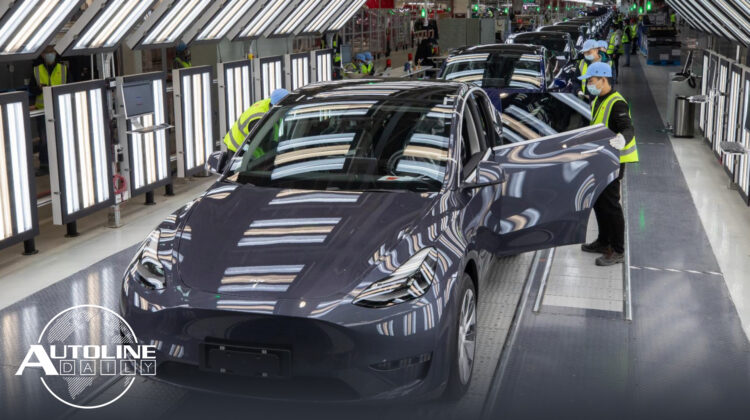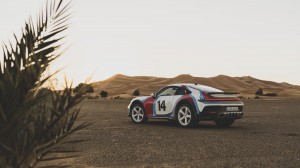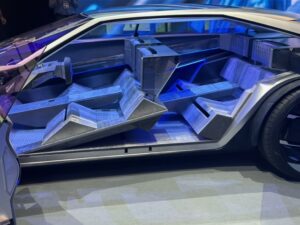
Listen to “AD #3480 – Bi-Directional Charging is a Money Maker; China Sales Up, But Tesla Down; Peugeot's Inflatable Car Seats” on Spreaker.
Follow us on social media:
Runtime: 8:44
0:00 China Sales Up, But Tesla Down
0:51 Germans Boost EV Sales Dramatically
1:30 Excess Capacity in North America
3:09 More Road Lanes Not a Solution
4:00 Mazda Uses Wankel as Range Extender
4:51 Porsche Offers Classic Rally Wraps
6:13 BYD Watch Has Alcohol Detector
6:43 Bi-Directional EV Charging is a Money Maker
7:38 Peugeot’s Inflatable Seats
Visit our sponsors to thank them for their support of Autoline Daily: Bridgestone, Intrepid Control Systems, and Schaeffler.
This is Autoline Daily, the show dedicated to enthusiasts of the global automotive industry.
CHINA SALES UP, BUT TESLA DOWN
We start out today in China, where Tesla’s sales dropped dramatically last month. According to the China Passenger Car Association, its sales tumbled by a shocking 41% in December, compared to a year ago, even though it cut prices. And it’s even more worrisome because car buyers were rushing to buy EVs just before EV subsidies ran out at the end of the year. The overall market grew 2.4% in December, with automakers selling 2.19 million vehicles. This year new energy vehicle sales are expected to reach 8.5 million units in China, accounting for 36% of total car sales.
GERMANS BOOST EV SALES DRAMATICALLY
Now let’s move over to Germany, where automakers saw their BEV sales surge last year. The Volkswagen brand sold more than 330,000 fully-electric vehicles globally in 2022, which was a gain of 23%, while its overall sales slipped about 7%. Mercedes more than doubled its BEV sales to 117,800 units last year, which is up a whopping 124%. And BMW’s BEV sales also soared 107% with more than 215,000 sold globally.
EXCESS CAPACITY IN NORTH AMERICA
Now let’s move over to North America, where the auto industry could soon be facing excess capacity. LMC Automotive reports that pre-Covid, there were 88 vehicle plants that could make 21 million vehicles a year. Now, that’s growing to 108 plants that can make 25 million vehicles. Here’s our Autoline Insight. Even though production capacity is going up by 4 million vehicles, sales will not grow anywhere near that. This means that capacity utilization will drop from over 90% over the last decade to barely over 70% later in this decade. A rule of thumb in the auto industry is that most plants have a break-even point at about 80% of capacity utilization. That means the overall industry will run below its breakeven point. One caveat, however. A lot of that extra capacity is coming from startups, and given the high failure rate of startups, some of those expansion plans may not happen.
MORE ROAD LANES NOT A SOLUTION
If you’ve got a busy road you just add more lanes, right? Maybe not. According to a New York Times article, research shows that widening highways will ease traffic, initially. But after only a few years that congestion often returns. And that’s because adding lanes can cause people to change their habits, like not taking public transportation or even altering their driving route. It also leads to an increase in greenhouse gas emissions, since there’s more cars on the road. This is why an expansion of Route 710 in LA was canceled last May, even though $60 million had already been spent on design and planning. While expansion is not a bad thing in all cases, experts say that fixing existing roads and providing transit should be considered first.
MAZDA USES WANKEL AS RANGE EXTENDER
The Wankel is making a comeback! Mazda confirmed that it will show off a version of the MX-30 with a rotary range extender at the Brussels Motor Show, which kicks off on the 14th. When used in cars, rotary engines were never known for their efficiency, but when running at a constant speed, which is how most range extenders operate, they can actually be very efficient. The all-electric version of the MX-30 has a 35.5 kWh battery pack that provides about 100 miles or 161 kilometers of range. But we don’t know what the range extender will add to that yet. We don’t know cost either, but we’re intrigued to know what that is as well. It’s never cheap to combine two powertrain types and a rotary is expensive to produce because of the complex machining it requires.
PORSCHE OFFERS CLASSIC RALLY WRAPS
Porsche recently celebrated the off-road heritage of the 911 with the 911 Dakar. And now lucky owners can really make their 911 Dakar look like a true classic Porsche rally car. It’s offering three distinctive wraps for the special-edition 911 that are inspired by liveries of teams from the 1970’s. This one should look especially familiar, taking inspiration from cars from the Martini Racing Team. Prices range from about 4,100 euros up to nearly 6,000 euros for the Martini Racing wrap. That may sound like a lot, but when owners are forking over $223,000 for the 911 Dakar, so a few more grand is probably not that big of a deal to them.
BYD WATCH HAS ALCOHOL DETECTOR
Now you can see if you’re sober at the same time you check the time. Chinese automaker BYD is launching a smartwatch, which features an alcohol detector. In addition to that, it can detect heart rate, body temperature, blood oxygen levels and blood pressure. BYD has received patent approval from China’s intellectual property office for the watch. But there aren’t many other details about it, like when it will come out or how much it will cost.
BI-DIRECTIONAL EV CHARGING IS A MONEY MAKER
All this week we’re highlighting the best new automotive technology that we saw at CES last week. No doubt you’ve heard of the advantages of bi-directional charging. That’s where EV owners can sell the electricity in their batteries back to their local utility during peak loads. They charge their cars when demand is low and sell it back at higher prices when demand is high. Two school districts in Massachusetts and Vermont used DC bi-directional fast chargers, and they earned $10,000 per bus selling electricity back to the utility as part of a pilot program last summer. Electric school buses are expensive, but this can really help offset the cost. We’ve got an interview with Manoj Karwa, the VP of sales for BorgWarner, which makes those bi-directional DC chargers, if you’d like to learn more about them.
PEUGEOT’S INFLATABLE CAR SEATS
Speaking of CES, we showed you that sleek concept car from Peugeot that debuted there last week. They call it the Inception, and it has a lot of interesting exterior design features. But what really caught our eye is the interior design, specifically the seats. They’re downright weird. They’re made up of wide triangular sections, with big square headrests. Linda Jackson, the CEO of the Peugeot brand told us that the seats are surprisingly comfortable, because they’re actually inflatable. You sit in the seat and pump it up around you until you’re snug and secure.
And that brings us to the end of today’s show. Thanks for making Autoline a part of your day.
Thanks to our partner for embedding Autoline Daily on its website: WardsAuto.com
Seamus and Sean McElroy cover the latest news in the automotive industry for Autoline Daily.









